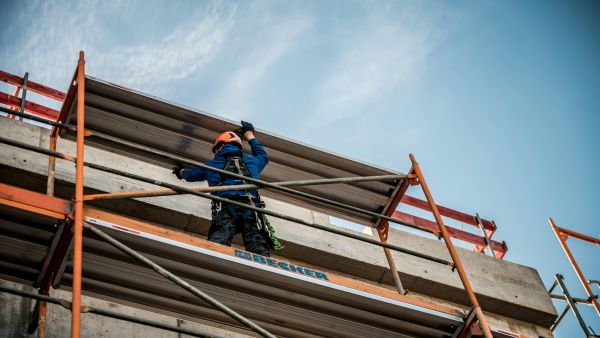Training the post-Grenfell generation of building control surveyors
Posted on: 21 May, 2025

“Since Grenfell and the changes that are going through the industry, I think apprenticeships have been revived.”
Name: Philip Castagnette
Company: Salus Building Control Approvers
Philip mentors an apprentice at Salus Building Control Approvers called Zoe, who had worked in an administrative role at the company for many years before expressing an interest in learning more about building control.
Zoe is one of two employees at the company who were offered apprenticeship opportunities after proving themselves in other areas of the business.
Philip strongly believes apprenticeships are suited to anybody who wants to upskill, not just young people:
“Zoe’s about my age, maybe a little bit younger, but about my age. So it’s sometimes an interesting dynamic because a lot of people think apprentices are all in their teens and twenties and that’s not necessarily the case. You can change whatever you want to do at any point, can’t you?”
Post-Grenfell competencies
Philip explains that the new regulations introduced after the Grenfell Tower tragedy have led to a rethink on how the building control industry sources talent:
“Since Grenfell and the changes that are going through the industry, I think apprenticeships have been revived. The industry is asking people to prove their competence, and the general building control cohort is mainly blokes in their 50s and 60s who haven’t sat an exam in 30 years. Some of them have said ‘no, I’m not doing it, I’m retiring’ and others have moved to other parts of the industry.
“There’s a real lack of talent and I think what a lot of companies are starting to do is try and get those people in the door or, as we’ve done at Salus, utilise people that are already in the company who’ve expressed an interest and then teach them the ropes.
“Trying to recruit is difficult in that there’s not many building control surveyors of a certain level available. So it’s a bit of a refresh. We have to start again.”
The scale of the regulatory changes mean that apprenticeships are likely to grow in popularity, according to Philip:
“Because of how big the changes have been, I think the industry needs a little while to grasp what it means and how we deal with it. But certainly I think companies will start looking at apprentices because they can come through from Class 1 to Class 2.
“Eventually the idea for us is that Zoe becomes Class 3 or Class 2F and we’ve made our own talent then, haven’t we? We’ve taken her from the beginning and now we’ve got her to this position and if we treat her right and look after her right, she’ll be here for a long time. And therefore we don’t need to go out and recruit someone because we’ve got that person in place.”
The importance of kindness
Treating Zoe – and all future Salus apprentices – the right way is very important to Philip.
Now a Class 4, 3H inspector and associate director at the firm, Philip was determined that Zoe’s experience as a trainee would be different to his own:
“When I was a trainee, I got treated a certain way and I didn’t think it was how it should be done. So now is my opportunity to put that right.”
Philip often felt like a burden when he was learning the ropes, and believes that it’s important to make time and space to mentor and support all trainees and apprentices so they can learn effectively. A big part of this is encouraging Zoe to take a long-term view, not be discouraged by short-term set-backs, and to celebrate achievements:
“This is a long road. There will be ups and downs. It might feel like you’re making progress and then you take a few steps back, but that’s the process.
“And it’s important to let her know when she’s done something well. For example, before Christmas, she did some really good bits of work, so I said to her ‘this is fantastic; we’re making progress’. It’s important that she understands that.”
Zoe also has strong support from her Apprenticeship Outcomes Officer at UCEM, Daniela. Zoe, Philip and Daniela meet every month to go through Zoe’s progress and set goals for the month ahead.
Daniela has “made the process very simple and easy to understand”, says Philip, which is important because “it’s all new to me as well – I’m learning too”.



